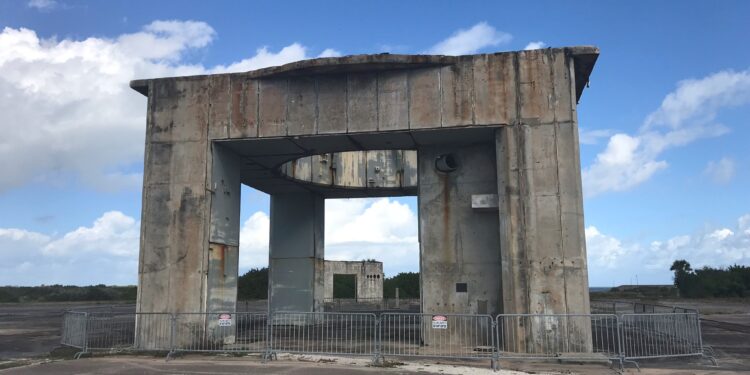There’s a plaque affixed to a concrete column at the site of what used to be NASA’s Launch Complex 34 that reads “Ad Astra Per Aspera (A Rough Road Leads to the Stars).
The plaque sits as a monument to three astronauts, Gus Grissom, Ed White, and Roger Chaffee, who died when a catastrophic fire ripped through their command module during a “plugs-out” preflight test for what was meant to be the first manned Apollo mission.
The date, January 27, 1967, is remembered for many things, including one of NASA’s most tragic days. However, on this 55th anniversary of the tragedy, the Apollo 1 fire also stands as a cautionary tale for our nation’s current endeavors in space, and an event that shines a light on the true value of whistleblowers.
The Apollo 1 fire was due to a myriad of issues. An excessive amount of flammable material in the spacecraft, a pure oxygen environment that only increased the veracity of the fire once it started, as well as a lack of protocol in the event of a fire on the ground.
North American Aviation, my grandfather’s employer and the contractor selected to build the command module (CM012), began construction at their California plant in August 1964, and problems immediately began to come to surface.
Individuals, including the primary crew, complained of the hazardous work environment surrounding the spacecraft, the amount of flammable elements that would be in the cabin, and what was described a lackluster workmanship from the contractor. Despite a Tiger Team being sent in to evaluate the situation, which led to a disastrous review, the project moved forward.
That isn’t to say there weren’t individuals who tried to put a pause on the project.
One man in particular, a quality control and safety inspector for North American by the name of Thomas Baron, “blew the whistle” when he compiled a report that described the state of the project as dangerous and not in alignment with the contractual obligations his employer had agreed to.
However, shortly after Baron released his report, his employment was terminated. But it wasn’t just Baron who came forward with concerns.
Ronald G. Newswald, a contributing editor at Space/Aeronautics, penned his skepticism of the Apollo program after reading a journal article from the American Society for Testing and Materials on factors in the operation of manned space chambers. Newswald wrote in a 1966 Science Journal article that, “With reliability figures and flight schedules as they are, the odds are that the first casualty in space will occur on the ground.”
William Bland, the Deputy Manager for Apollo in the Reliability and Quality Assurance Office at Manned Space Center, had already raised concerns of his own. He eventually wrote to the manager of NASA’s Apollo Spacecraft Program Office that included a report on the Apollo Spacecraft Non-Metallic Materials Control Program that listed several issues he found concerning.
For instance, in Bland’s opinion, the command module lacked automatic fire detection, leaving it to the crew to discover any issue. Even worse, most materials surrounding the crew, including pads and equipment, were combustible, and depressurizing the cabin, according to his calculation, would take far too long.
John Dietz, a NASA engineer working in Houston as part of the Apollo Program’s Reliability, Quality, and Test Division at Manned Spacecraft Center, agreed with Bland, and repeatedly attempted to escalate what he viewed as a dangerous amount of flammable materials in the command module.
Although Baron’s credibility was called into question during subsequent Congressional investigations, his story, and the efforts of the others who attempted to bring issues to light, should still be recognized.
Particularly in the space exploration industry, where lives hang in the balance, any and all concerns should be given due attention. Elon Musk recently making an apparent joke of whistleblowing not only will discourage those under his purview from coming forward with real issues, but is particularly concerning given his company, SpaceX, and its ultimate goal of “making life multiplanetary,” a task that certainly will involve elements of risk to human life.
Regardless of the field, whether it’s in the space industry or the world of finance, the idea of “blowing the whistle” should be commended and woven into a company’s culture. Open channels for those who encounter issues should not just be present, but also created in a manner that requires review and response.
It’s certainly not possible to say whether or not the Apollo 1 fire would have still occurred if those who came forward with concerns had been properly acknowledged.
Perhaps the pure oxygen environment still would have been used and perhaps taking out a portion of the flammable materials inside the command module wouldn’t have made enough of a difference.
These “what ifs” miss the point.
What should be taken away from the tragedy, beyond commemorating the brave men whose lives were lost, is the importance of an effective means for escalating issues and the need for that channel to be present from the start of a project.
The plaque at Launch Complex 34 acknowledges the “rough road” that led to the stars. Going forward, let’s help whistleblowers smooth the course.


